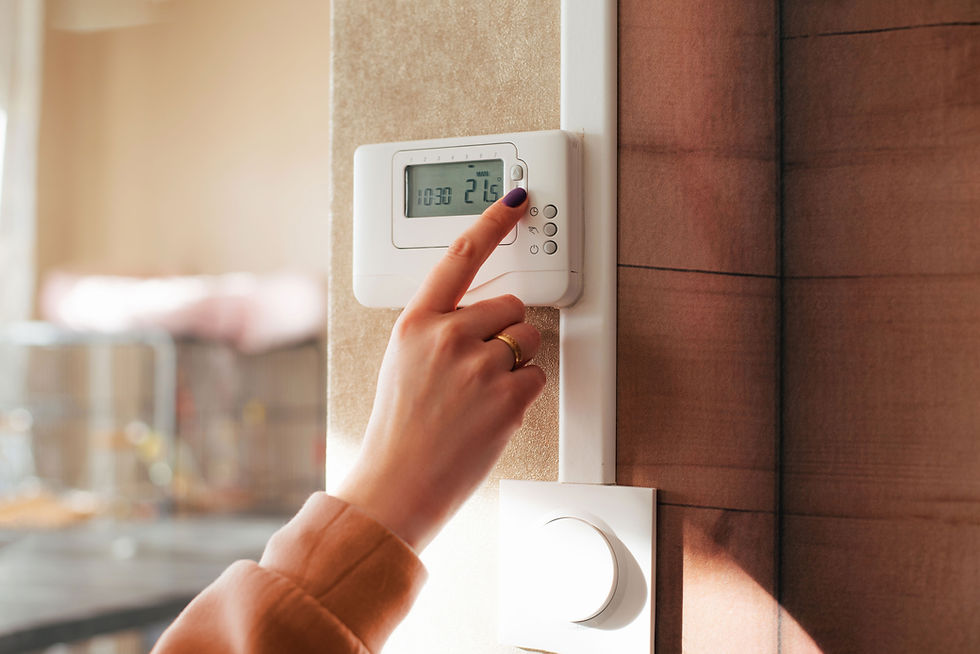Unconventional Energy-Saving HVAC Tips for Winter Comfort: What You Haven't Heard Before
- Oct 25, 2024
- 4 min read
As the winter chill creeps in and the temperatures drop, keeping your home warm can become costly. With natural gas prices up to 25% higher than last year and electricity rates rising, homeowners are eager to find ways to save energy and keep utility bills manageable. This post provides lesser-known tips to optimize your HVAC system during these cold months. Implementing these strategies can help you maintain comfort without overspending.
1. Optimize Your Thermostat Settings
Optimizing your thermostat can make a significant difference in your energy bill. Instead of a steady high temperature, try lowering the setting by one or two degrees. Studies show that setting your thermostat to around 68°F can lead to a potential savings of 1% for each degree reduced over an eight-hour period. Consider investing in a programmable or smart thermostat to create schedules based on your daily routine.
For example, if you lower your thermostat to 62°F while you're at work or asleep, you could save up to $180 a year on heating costs.
2. Seal and Insulate Ducts
Heating ducts are notorious for leaking and can account for a 10% to 30% loss of energy. Check your ducts for disconnections or gaps, and use metal tape or mastic sealant to secure them.
Additionally, insulating ductwork in unheated spaces, like attics, can reduce energy losses by keeping the air warm as it travels through your home. In a typical household, this could mean saving around $200 annually.
3. Use Ceiling Fans Wisely
Many people associate ceiling fans with summer cooling, but they can be invaluable in winter as well. By reversing the direction of your ceiling fans to clockwise, warm air is pushed down from the ceiling, which helps maintain a consistent temperature throughout the room.
Running ceiling fans on a low setting can increase comfort and improve heat distribution, potentially making you feel 4°F warmer without adjusting the thermostat.
4. Harness the Power of Sunshine
Winter sunlight can be a powerful ally in your home heating strategy. Open your curtains during the day to let natural light in and allow the sun's warmth to elevate your indoor temperature. Closing the curtains at night adds an extra layer of insulation, preventing heat from escaping.
Investing in thermal curtains can further enhance this effect. In fact, thermal curtains can reduce heat loss by up to 25%, leading to lower heating bills while adding a touch of style to your rooms.
5. Regular HVAC Maintenance
While it's not unconventional, many homeowners often neglect regular HVAC maintenance, leading to decreased efficiency. Scheduling a professional inspection before winter can help you avoid costly heating failures.
Professionals can clean components, check for leaks, and ensure your furnace is running effectively. A well-maintained HVAC system can operate at 10% to 20% higher efficiency, translating into real savings on your heating bills.
6. Upgrade Your Air Filter
The type and condition of your air filter can have a large impact on your HVAC system’s efficiency. Opt for high-efficiency particulate air (HEPA) filters that capture smaller particles while allowing for better airflow.
It's essential to change the air filter every 1 to 3 months. Neglecting this simple task can reduce your system's efficiency by up to 15%, which can lead to increased energy costs.
7. Utilize Zoning Systems
If your home has multiple rooms used at different times, a zoning system can significantly reduce energy usage. This enables you to set different temperatures for each area of your home, focusing heat where it's needed most.
For instance, keep bedrooms cooler at night while keeping living areas warm during the day. This approach can reduce energy consumption by about 20% compared to heating the entire home uniformly.
8. Consider Your Humidity Levels
Humidity impacts our comfort levels more than many realize. Maintaining a humidity level of about 30-50% can make your home feel warmer. A humidifier can help add moisture to the air, allowing you to lower your thermostat without sacrificing warmth.
Studies indicate that increasing humidity can make you feel 4-6 degrees warmer, which can lead to meaningful savings on your heating bill.
9. Close Off Unused Rooms
If certain rooms sit unused in winter, consider closing their vents and doors. By redirecting your HVAC efforts to occupied areas, you can improve overall system efficiency.
Be cautious not to block airflow completely. Minimal airflow helps avoid pressure issues in your ventilation system and prevents moisture buildup that could lead to mold.
10. Explore Alternative Heating Solutions
Consider supplemental heating options like space heaters for smaller areas or electric blankets while relaxing. Using these alternatives allows you to lessen the demand on your central heating system.
Safety should always come first, so follow all recommended guidelines to prevent any potential hazards.
Final Thoughts
By incorporating these unconventional energy-saving tips into your winter routine, you can enhance your comfort while also reducing energy costs. Whether you adjust your thermostat, seal ducts, or tap into natural sunlight, there are countless ways to boost your home's energy efficiency this season.
Making smart choices about your HVAC system doesn't just save money; it also supports a more sustainable lifestyle. Prepare for winter with confidence, embrace cozy warmth, and enjoy the season without a financial chill. Happy heating!



Comentários